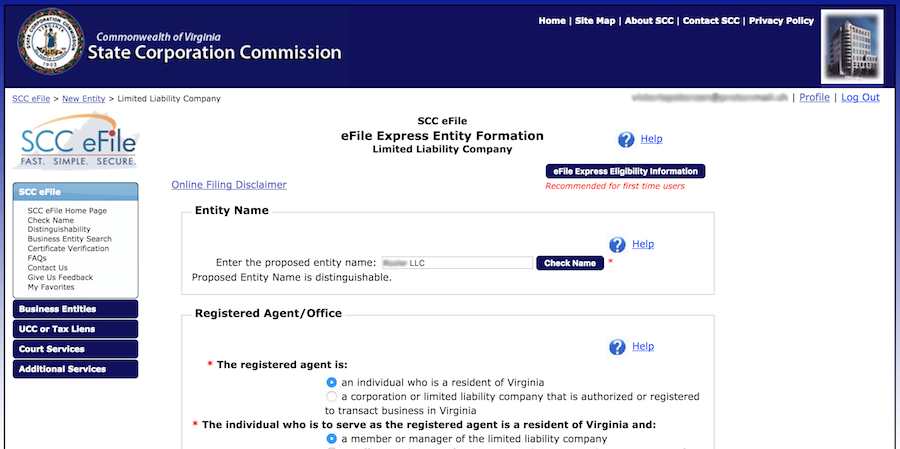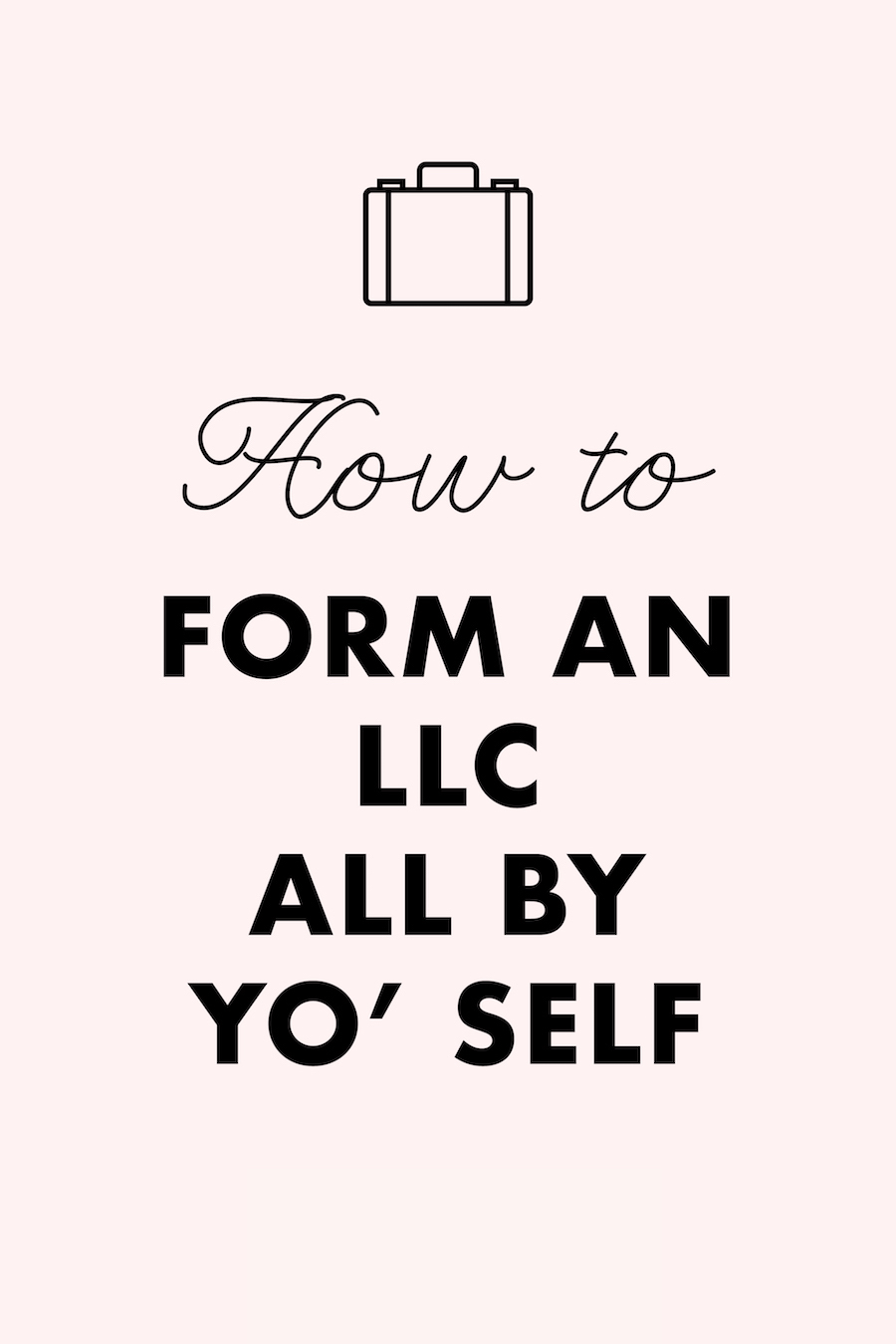When I first started researching how to form an LLC, the articles I read made it seem like a super difficult process that required a fancy lawyer or expensive service. Even LegalZoom charges a whopping $149 for the most basic business formation service.
Thankfully, it really isn’t that hard for a normal person to form an LLC on their own.
I formed my LLC in August (yay!) and I’m proud to say that now I’m officially a business owner. #ADULTING so hard right now.
Hopefully, this article will give you some insight into the process of forming an LLC without a lawyer!
Why Should You Form an LLC?
Let me preface this by saying that I am not offering you legal advice, I’m only sharing my personal experience.
If you’re an independent blogger who’s starting to make bank, then you should absolutely consider registering your business legally somewhere as soon as possible! There are quite a few options for doing that including such as Sole Proprietorship, LLC, and Corporation.
The majority of bloggers who have started to make money but aren’t rolling in the dough will probably be best off forming an LLC, especially if they don’t plan on taking on investors in the near future.
Forming an LLC has a ton of benefits including the ability to write off your business expenses on your tax forms, and protection of your personal assets if you are sued. These are the two main reasons why I chose to form an LLC for my business.
Related: Start a Blogging Business Today
Where Should You Form Your LLC?
I am American, so this article will pertain to US-based LLCs. I did a ton of research on which state to form my LLC before I did it. I always heard that Delaware was the most favorable state to open a business in, so I was leaning towards that state, even though my official residence is in Virginia.
After reading many articles which only dropped links to some expensive LLC service in Delaware, I finally came across useful information. Forming an LLC outside of your residential state – even if you run a digital, non-location-dependent business – is not a good idea. Essentially, from what I understand: if you register an LLC outside your home state, you need to register another LLC in your state, claim the first one, and then file two different state tax forms.
No, thank you!
I decided to form an LLC in my state of residence (Virginia), but I recommend you do your own research and come to your own conclusion. This is what worked for me.
Each state has its own set of requirements for opening a business. Some allow you do it online (holla!) and others make you do it by mail. The Small Business Administration can direct you to the proper website for your state.
Form an LLC Online
If you’re filing an LLC in Virginia, you’re in luck and can do everything online. Head to this website.
Click “Register”
You’ll need to create an account to proceed.
After you’ve created your account, you have to check and see if your company name is already taken or not. If it isn’t, then you can go ahead and register the name.

I decided to be my own Registered Agent (I still don’t know what this is, but whoever it is needs to live in the state, that’s why I decided to do it for myself!)
For the Registered Address, I used my home address in Virginia. I may look into paying a Registered Agent service in my state to take on this responsibility and avoid having my home address publicly accessible on the internet. Unfortunately, these babies are expensive so for the moment, I am my own registered agent and address!
Sign your name electronically and then click “Pay and File”
Next, you have to pay the fee to file your LLC. In Virginia, the cost is $100 plus a $2.35 service fee.
After you fill in your credit card and address info, you should get to the “eFile Express Confirmation” page, confirming you’ve successfully paid to register your LLC!
Using Your LLC
That process was NOT as bad as everyone made it seem. In fact, opening up a business banking account was WAY more of a pain, in a way I didn’t expect it to be.
At this point, I had to start transferring all my “assets” (fancy!) into the name of the LLC.
This means, my LLC now owns everything and receives payments for all the work I do. Of course, since I am the owner of the LLC, everything is still technically “mine.” My LLC is me, and I am my LLC. We are one. (Except if I get sued, then my LLC is me, and I am not my LLC!)
In all seriousness, after my LLC was formed, I began to transfer everything business-related into the name of my company.
This included:
- My hosting account (I use DigitalOcean but recommend Bluehost for new bloggers)
- All my domains registered at Namecheap
- Google AdSense
- Shareasale
- Amazon
- Skimlinks
- RewardStyle
- Any other affiliate programs I may earn money from
That part was kind of annoying but I guess that’s the price you pay for being a #GIRLBOSS!
It really wasn’t too difficult and pretty much all of these companies will have a slot for my business name so I didn’t have to remove my name completely. Since then, anytime I register for a new affiliate program, I register under my business name.
There it is! That’s how I formed my LLC in an easy and painless way.
I hope your state allows electronic LLC filing like mine so you can be a business owner as quickly as possible. Let me know how it goes for you.


Thank you for writing this post! I literally had the same thought process, frustrations and now revelation!!! Legal zoom almost got me!
Thanks Courtney! Of course! I hope other business owners realize that forming an LLC isn’t so complicated. It’s made out to be way worse than it actually is 🙂
Thanks for this content! I have been saving money to use legalzoom.com, however this has encouraged me to diy my llc. I wonder what hoops I will have to jump through since I live in NY.
Outstanding post dear, Thanks for sharing, appreciate your efforts
Pennsylvania has the e-file as well. Just in case anyone is wondering.
The registered agent basically is the person who can accept legal documents. If, heaven forbid, you were sued the registered agent would be the person on the other end of “you got served.” This is why the address cannot be a P.O. box.
Hope this was helpful
Straight to the point! Great article. I was looking into LegalZoom and other business registration sites and this was the best article I read on this subject. Thank you
Hey, first off, love your writing style. I was hoping to help clarify some things for you. The thing to consider is that you can file for any business entity online from your Secretary of State website. The problem with filing your LLC online is that all you recieve when you do so is the Certificate of Organization. In order to actually operate as an LLC, you do in fact need an Operating Agreement and you need to keep Member meeting minutes (document your member or board of directors meetings).
Another key component of operating as an LLC is having Member meetings. If you are a single member LLC (one owner) you cannot effectively hold votes, therefore you cannot technically act as a business. If litigation arises, the protection offered by the LLC will be considered nullified and void because you are acting more as an extension of yourself than as a business. The IRS considers this a disregarded entity. Similar warning for filing a Corporation online. No Corporate Bylaws, Shareholders minutes, or Board minutes. You must act like the entity you are utilizing in order to recieve the legal protections it offers. I would love to connect and share more knowledge with you, so that you can offer as much value as possible to your followers on this topic. Please feel free to reach out at [email protected]
Hi Tiffany, I am under the impression that an operating agreement is mandatory as per laws in only 5 states: California, Delaware, Maine, Missouri, and New York.
Your article was super fun to read and demystified some of the unknown aspects of forming an LLC. In addition to what Tiffany said, forming an LLC can cost hundreds of dollars a year to maintain. In California, the fee is $800/year and you MUST file Form 568 (LLC tax return) every year. Unfortunately many clients go out and get themselves an LLC, and never file or pay, and a few years later they are getting nasty FTB tax notices demanding thousands of dollars of tax, penalties, and interest. Then they pay our firm hundreds or thousands of dollars to fix this. We prepare all the tax returns and try to negotiate with the FTB to bring the cost down.
Most new businesses would be better served by operating as a sole proprietor (Schedule C). It IS a business. And all you have to do is start making money. That’s it. You report your income and expenses right on your personal tax return.you only pay tax on your business’ profit.
Yes, there are situations where an LLC, S-Corp, or Corp is a better option, but you really should consult a business attorney AND a CPA or EA before forming these business entities. A couple hundred dollars to these pros for a consult will save you thousands of dollars in tax, penalties, and interest. Forming an LLC is not “one and done”, it requires maintenance.
Also, I hear so many people thinking that forming an LLC is #adulting. It so isn’t! It is much more adult to realize one’s own lack of knowledge and experience, and then either get that knowledge, or consult with professionals.
Hi Mackenzie,
I see your point, but with all due respect, accountants’ fees are exorbitant and as a new business owner, I didn’t have the means to hire one. So I took the risk, with my measly income to form an LLC on my own without the help of a “professional,” and the purpose of this article is to help others in the same boat do this on their own and save a large sum of money.
I’m sorry but I have little respect for people who’s main source of income is gouging others who are trying to earn an honest living. Knowledge should be free.
Best,
Blog
I wish I would’ve saw this two months ago! I signed up with zen business, but it was around $850 for the final account setup
Argh, at least you can take it as a business expense!
Brilliant 🙂 I learned and I laughed!
Thank you for this post!